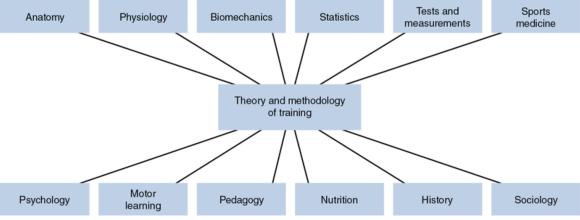Understand the objectives of training
This is an excerpt from Periodization-6th Edition by Tudor O Bompa,Carlo Buzzichelli.
Training is a process by which an athlete is prepared for the highest level of performance possible. The ability of a coach to direct the optimization of performance is achieved through the development of systematic training plans that draw upon knowledge garnered from a vast array of scientific disciplines, as shown in figure 1.1.

Figure 1.1 Auxiliary sciences.
The process of training targets the development of specific attributes correlated with the execution of various tasks. These specific attributes include multilateral physical development, sport-specific physical development, technical skills, tactical abilities, psychological characteristics, health maintenance, injury resistance, and theoretical knowledge. The successful acquisition of these attributes is based upon utilizing means and methods that are individualized and appropriate for the athletes' age, experience, and talent level.
- Multilateral physical development: Multilateral development, or general fitness as it is also known, provides the training foundation for success in all sports. This type of development targets the improvement of the basic biomotor abilities, such as endurance, strength, speed, flexibility, and coordination. Athletes who develop a strong foundation will be able to better tolerate sport-specific training activities and ultimately have a greater potential for athletic development.
- Sport-specific physical development: Sport-specific physical development, or sport-specific fitness as it is sometimes referred to, is the development of physiological or fitness characteristics that are specific to the sport. This type of training may target several specific needs of the sport such as strength, skill, endurance, speed, and flexibility. However, many sports require a blending of key aspects of performance, such as power, muscle endurance, or speed-endurance.
- Technical skills: This training focuses on the development of the technical skills necessary for success in the sporting activity. The ability to perfect technical skills is based upon both multilateral and sport-specific physical development. For example, the ability to perform the iron cross in gymnastics appears to be limited by strength, one of the biomotor abilities. Ultimately the purpose of training that targets the development of technical skills is to perfect technique and allow for the optimization of the sport-specific skills necessary for successful athletic performance. The development of technique should occur under both normal and unusual conditions (e.g., weather, noise, etc.) and should always focus on perfecting the specific skills required by the sport.
- Tactical abilities: The development of tactical abilities is also of particular importance to the training process. Training in this area is designed to improve competitive strategies and is based upon studying the tactics of opponents. Specifically, this type of training is designed to develop strategies that take advantage of the technical and physical capabilities of the athlete so that the chances of success in competition are increased.
- Psychological factors: Psychological preparation is also necessary to ensure the optimization of physical performance. Some authors have also called this type of training personality development training. Regardless of the terminology, the development of psychological characteristics such as discipline, courage, perseverance, and confidence are essential for successful athletic performance.
- Health maintenance: The overall health of the athlete should be considered very important. Proper health can be maintained by periodic medical examinations and appropriate scheduling of training, including alternating between periods of hard work and periods of regeneration or restoration. Injuries and illness require specific attention, and proper management of these occurrences is an important priority to consider during the training process.
- Injury resistance: The best way to prevent injuries is to ensure that the athlete has developed the physical capacity and physiological characteristics necessary to participate in rigorous training and competition and to ensure appropriate application of training. The inappropriate application of training, which includes excessive loading, will increase the risk of injury. With young athletes it is crucial that multilateral physical development is targeted, as this allows for the development of biomotor abilities that will help decrease the potential for injury. Additionally, the management of fatigue appears to be of particular importance. When fatigue is high, the occurrence of injuries is markedly increased; therefore, the development of a training plan that manages fatigue should be considered to be of the utmost importance.
- Theoretical knowledge: Training should increase the athletes' knowledge of the physiological and psychological basis of training, planning, nutrition, and regeneration. It is crucial that the athlete understands why certain training activities are being undertaken. This can be accomplished through discussing the training objectives established for each aspect of the training plan or by requiring the athlete to attend seminars and conferences about training. Arming the athlete with theoretical knowledge about the training process and the sport improves the likelihood that the athlete will make good personal decisions and approach the training process with a strong focus, which will allow the coach and athlete to better set training goals.
Learn more about Periodization: Theory and Methodology of Training, Sixth Edition.
More Excerpts From Periodization-6th EditionSHOP

Get the latest insights with regular newsletters, plus periodic product information and special insider offers.
JOIN NOW
Latest Posts
- Sample mental health lesson plan of a skills-based approach
- Sample assessment worksheet for the skill of accessing valid and reliable resources
- Help your students overcome what holds them back from making health-promoting choices
- Example of an off-season microcycle
- Modifying lifts
- Screening for multilevel programs in a team environment


